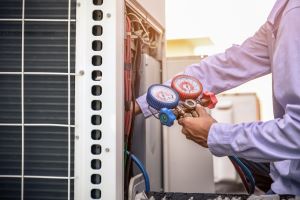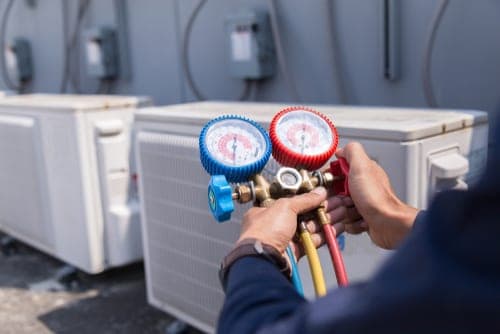Flexible System Upgrades with DMAKS HVAC Custom Options.
Flexible System Upgrades with DMAKS HVAC Custom Options.
Blog Article
How to Pick the Right HVAC System for Your Requirements
Choosing the ideal A/c system is an essential choice that requires careful consideration of various elements. The myriad of system types available can complicate this procedure, leading one to wonder which course eventually leads to optimum convenience and effectiveness.
Assess Your Home Size
Examining your home size is an important first action in picking the suitable Cooling and heating system. A HVAC system that is too little will certainly have a hard time to maintain comfortable temperature levels, leading to enhanced energy usage and use on the device.
To precisely examine your home dimension, measure the square video of each room, thinking about variables such as ceiling height and the layout. Additionally, think about the insulation top quality and the variety of windows, as these components influence thermal performance. Homes with open flooring plans might need various system configurations contrasted to those with several separated spaces.
Making Use Of the Handbook J lots estimation technique can give a more exact price quote of your HVAC requires. This technique represent different factors, including neighborhood environment, solar gain, and occupancy patterns. By carefully reviewing these aspects, you can make sure that your selected heating and cooling system is suitably sized, leading to boosted convenience, energy effectiveness, and durability of the devices.
Determine Your Spending Plan
Identifying your budget is an essential step in the cooling and heating system option process, as it sets the criteria for your choices - DMAKS HVAC. A HVAC system is a considerable financial investment, and recognizing your financial restrictions will certainly assist limit selections that fit within your means
Begin by evaluating not just the initial purchase rate however likewise installment costs, which can vary considerably relying on the intricacy of the job. Moreover, think about recurring costs such as maintenance, repair work, and energy intake. A system might appear budget friendly initially but can result in higher expenses with time if it is much less efficient.
It is recommended to allot a backup fund for unexpected expenditures that might occur during installation or preliminary system changes (DMAKS HVAC). Additionally, check out funding options or rebates that may be available, as these can alleviate the concern of ahead of time costs
Eventually, having a clear budget plan allows you to engage with HVAC specialists more effectively, ensuring you get customized advice that aligns with your monetary objectives and home needs. By being persistent about your spending plan, you can make enlightened choices that enhance convenience without endangering economic stability.
Evaluate Power Performance
Energy effectiveness plays a vital role in the total performance and cost-effectiveness of your a/c system. When picking a system, it is vital to consider its power performance rankings, as these numbers directly influence your utility costs and environmental impact. Look for systems with a high Seasonal Energy Efficiency Ratio (SEER) for cooling and a high Yearly Fuel Usage Efficiency (AFUE) ranking for home heating. Higher rankings indicate higher efficiency, indicating more comfort for much less power usage.
Furthermore, think about the Power Star qualification, which indicates that the system satisfies stringent effectiveness guidelines established by the Epa. Buying a Power Star-rated heating and cooling system can bring about substantial cost savings with time, particularly in locations with severe temperature fluctuations.
One more variable to review is the system's size and capability. An oversized or small device can result in inadequacy and increased energy costs. DMAKS HVAC. Proper sizing, often determined through a Hands-on J tons calculation, guarantees that the system operates at ideal performance


Consider Climate and Atmosphere
When picking an a/c system, it is essential to take into consideration the neighborhood climate and ecological conditions, as these elements considerably affect more helpful hints the system's efficiency and efficiency. Different regions experience varying temperature extremes, moisture levels, and seasonal adjustments, all of which impact home heating and cooling down needs.

Additionally, regional environmental factors, such as air quality and possible irritants, need to educate your option. Systems geared up with sophisticated filtration innovations can aid minimize contaminants and supply cleaner air. Additionally, take into consideration the power sources readily available in your area-- some HVAC systems are extra efficient when powered by natural gas or eco-friendly power sources.
Eventually, aligning your a/c system option with your local climate and environmental factors to consider will certainly lead to enhanced convenience, boosted efficiency, and lower power prices.
Explore System Kind and Functions
As house owners seek to maximize comfort and performance, exploring the numerous kinds of a/c systems and their distinct features becomes necessary. The key sorts of heating and cooling systems consist of main air conditioning, warmth pumps, ductless mini-split systems, and furnaces. Each system uses distinctive benefits customized to different demands and choices.
Air conditioning systems provide consistent cooling throughout a home, making them perfect for bigger rooms. Heat pumps work as both home heating and cooling down solutions, making use of electrical power to transfer warmth, which can lead to reduced power costs. Ductless mini-split systems are coming to be significantly popular due to their flexibility and ease of installment, permitting homeowners to manage the temperature level in private areas without considerable ductwork.

Final Thought
In final thought, choosing the proper a/c system necessitates careful consideration of various factors, including home size, budget restrictions, power performance, local environment, and readily available system kinds. An extensive analysis of these aspects makes certain optimum comfort and cost-effectiveness. By complying with an organized method, house owners can make enlightened decisions that align with their certain demands and preferences, ultimately bring about boosted indoor air quality and energy cost savings.
Report this page